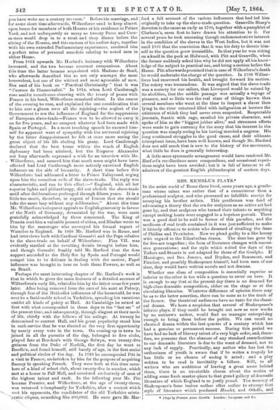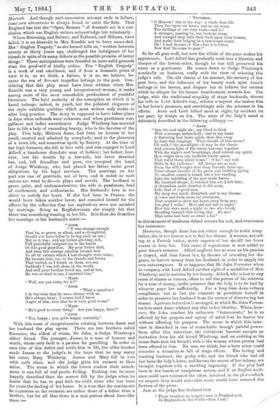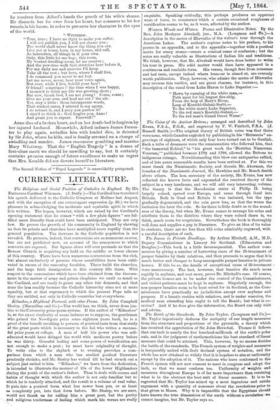MRS. KEMBLE'S PLAYS.*
Ix the artist world of Rome there lived, some years ago, a gentle- man whose talent was rather that of a connoisseur than a professional sculptor, and who possessed an infallible receipt for annoying his brother artists. This gentleman was fond of advocating a theory that the era for sculpture as an active art had gone by, and that sculptors who turned their talents to anything except making busts were engaged in a hopeless pursuit. There was a good deal to be said in favour of this paradox, and the modicum of real truth contained in it was just sufficient to make it bitterly offensive to artists who dreamed of rivalling the fame of Phidias and Praxiteles. Now we plead guilty to a like heresy with regard to the Elizabethan drama. The time has gone by for five-act tragedies ; the form of literature changes with succes- sive generations; and the style which suited the days of the Tudors and Stuarts is not adapted for those of the Guelphs. If Messinger, and Ben Jenson, and Dryden, and Beaumont, and Fletcher, and possibly Shakespeare himself, had been men of our time, they would have written novels and not dramas.
Whether one class of composition is essentially superior or inferior to the other is too wide a question to enter on here. It is enough to say that at the present day there is no demand for high-class dramatic composition, either on the stage or at the circulating libraries. Whatever difference of opinion there may be as to the latter assertion, there can be none as to the truth of the former. Our theatrical audiences have no taste for the classi- cal drama. We have a suspicion that several of Shakespeare's inferior plays, if they could be brought out now as new works by an unknown author, would find no manager enterprising enough to bring them before the public. We can recall no classical drama within the last quarter of a century which has had a genuine or permanent success. During this period we have had no lack of literary talent of a very high order, and, there- fore, we presume that the absence of any standard contributions to our dramatic literature is due to the want of demand, not to any lack of supply. Practically, any author who has lost the enthusiasm of youth is aware that if he writes a tragedy he has little or no chance of seeing it acted ; and a play written to be read is inevitably a failure. Still, to all writers who are ambitious of leaving a great name behind them, there is an irresistible charm about the notion of adding some fresh master-piece to that grand gallery of dramatic literature of which England is so justly proud. The memory of Shakespeare's fame incites author after author to attempt that style of literature which produced .Hantlet, and Othello, and * Plays Sr Frances Anne Humble. London: Longman and Co.
Macbeth. And though each successive attempt ends in failure, some new adventurer is always found to enter the lists. That England has lost the "Open, Sesame "of dramatic art is a con- clusion which our English writers acknowledge but reluctantly.
Where Browning, and Bulwer, and Talfourd, and Milman, have failed, it is no discredit to Mrs. Kemble not to have succeeded. Her English Tragedy," as she herself tells us, "written between twenty or thirty years ago, challenged the indulgence of her friends in spite of its many defects as the possible promise of better things." These anticipations were founded on more solid grounds than the good-will of kindly critics. The "English Tragedy' is a work of real excellence, and if from a dramatic point of view it is, as we think, a failure, it is so, we believe, be- cause the era of five-act tragedies belongs to the past. Con- sidering that this play must have been written when Mrs. Kemble was a very young and inexperienced woman, it ranks among some of the most remarkable productions of youthful literature. The bold audacity of the conception on which it is based belongs, indeed, to youth, but the polished elegance of the style exhibits qualities which most writers only attain to after long practice. The story is supposed to have taken place in days when railroads were unknown and when gentlemen were gallants and ladies sweethearts. Judge Winthrop has married late in life a lady of exceeding beauty, who is the heroine of the play. This lady, Mistress Anne, had been an heiress in her youth, courted and admired by everybody, used to the pleasures of a town life, and somewhat spoilt by flattery. At the time of her high fortunes, she fell in love with and was engaged to Lord Alford, a handsome dissolute man of fashion ; her father, how- ever, lost his wealth by a law-suit, her lover deserted her, and, left friendless and poor, she accepted the band of Judge Winthrop, who had placed her father under great
obligations by his legal services. The marriage pn her part was one of gratitude, not of love, and it ended as such unions are wont to do—in plays and novels. The husband is grave, quiet, and undemonstrative; the wife is passionate, fond of excitement, and enthusiastic. Her husband's love is too silent to satisfy her heart. If she had been in France, she would have taken another lover, and consoled herself for the offence by the reflection that her aspirations were not satisfied by marriage. Being an Englishwoman she simply felt that there was something wanting in her life. It is thus she describes her marriage to her husband's sister :—
"
was strange enough
That he, so grave, so silent, and so thoughtful, Should e'er have fallen to loving such an one ; But so it was ; and my father growing sick, Full gratefully resigned me to the hands Of this good guardian. My poor father died, And then this strange relation became heir To all th' estates which I had thought were mine ; He became heir, too, to the friends and lovers That waited, as I found, on them, not me.
Suddenly I was left alone in the world, And still your brother loved me, and at last, He was so kind to me, I married him."
"MARY.
"Well, are you sorry for it ?"
"ANNE. "What a question ?
I do but wish that he were oftener with us.
He's always busy ; I scarce feel I know Aught of him, save that he is very good to me."
"MARY.
"He's good to every thing! Are you happy, then ?"
"ANNE.
"Yes, happy ; yes, quite happy, certainly."
With this want of comprehension existing between Anne and her husband the play opens. There are two brothers called Forrester, the eldest of whom, Sir John, is Judge Winthrop's oldest friend. The younger, James, is a man of honour and worth, whose only fault is a pagtion for gambling. In order to cure him of this defect and settle him in life, the elder brother sends James to the judge's, in the hope that he may marry his sister, Mary Winthrop. James and Mary fall in love with each other, and the judge gives his consent to their union. The scene in which the lovers confess their attach- ment is one full of real poetic feeling. Nothing can be more happily described than the sorrow felt by the judge when he learns that he has to part with the child sister who has been for years the darling of his house. It is true that the sentiments he expresses on the occasion are rather those of a father than a brother, but for all that there is a true pathos about lines like these :—
" WLNTHROP.
"0 Heaven! this is the way ! a whole dear life They live upon our knees, and in our arms, The darlings of our very souls—and lo ! A stranger, passing by, but beckons them, And straight they turn their back upon their homes, And make their lodging in a new-found heart. Oh! I had dreamt of this—but it is bitter, Now that 'tis come to pass !"
So far all goes well, but now the villain of the piece makes his appearance. Lord Alford has gradually sunk into a libertine and sharper of the lowest order, though he has still preserved his name as a gentleman. He comes down to Judge Winthrop's nominally on business, really with the view of seducing the judge's wife. The old charm of his manner, the memory of her past love, and the influence of his beauty work upon Anne's feelings in his favour, and dispose her to believe the excuses which he alleges for his former heartlessness towards her. The judge, with the traditional stupidity of stage husbands, throws his wife in Lord Alford's way, refuses a request she makes him in her lover's presence, and unwittingly aids the schemer in his efforts. Anne and Lord Alford meet at night, by accident on her part, by design on his. The state of the lady's mind is delicately described in the following soliloquy :— " Amis.
"Into the cool night air ; my blood is thick
With a strange melancholy; and in my heart A fluttering fear beats quick, then dies away In faint dim longings. What should all this mean ?
I'll walk i' the moonlight—it may be the chaste And solemn light of the starry heavens, together With the night's cool breathings, shall refresh my spirit.
How bright thou art, ineffable lonely queen, That rurst these silent hours ! 0 me ! my soul Melts in thy radiance ! All things are at rest. From the still boughs that sleep beneath thine eye Faint odours breathe of the green and budding spring No smallest sound is heard, but a low rustling Like the unfolding of the new made leaves.
My husband sleeps ; I watched him ore I left him; A dreamless quiet slumber it did seem, Like that of a good man.
My sleep was much disturbed, and in my dreams
A voice and form arose for evermore, That seemed to draw my heart away from me ; I'm glad I woke ! How sad and fair is night !
How fair wore such a night to two who loved,
Standing beneath this loving sky. Ah me !
That mine had been so sweet a lot."
in this moment of weakness Alford renews his suit, and overcomes her resistance.
However, though Anne has not virtue enough to resist temp tation, she is too honest not to feel her shame. A woman, accord- ing to a French writer, never repents of her sin till her lover ceases to love her. This cause of repentance is now added to poor Anne's remorse. Alford neglects her as soon as his passion is cloyed, and then forces her, by threats of revealing her dis- grace, to borrow money from her husband in order to supply his own extravagance. It so happens that Sir John Forrester when in company with Lord Alford catches sight of a medallion of Mrs. Winthrop, and is smitten by her beauty. Alford, who is lost to any sense of shame or honour, offers to sell tbe person of his mistress for a sum of money, under pretence that the lady is to be had by whoever pays her sufficiently. For a long time Anne refuses compliance, but at last she consents to prostitute herself in order to preserve her husband from the sorrow of discovering her shame. Aprivate interview is arranged, at which Sir John Forres- ter is to meet Anne without any clue to her identity. When, how- ever, Sir John reaches his unknown " innamorata," he is so affected by her prayers and agony of mind that he leaves her without effecting his purpose. The scene in which this inter- view is described is one of remarkable though painful power. Soon after this interview, the chivalrous baronet accepts an invitation from his old friend Winthrop, and on arriving at his house finds that his friend's wife is the woman whose person had been offered to him. No one, we think, but a born actor could conceive a situation so full of stage effects. The loving and trusting husband, the guilty wife, and the friend who had all but been the lady's lover, and knows the secret of her infamy, are brought together with a startling ingenuity. If the play had been in the hands of competent actors, and if an English audi- ence could have tolerated the ideas involved in the plot—which we suspect they would not—this scene would have ensured the fortune of the piece.
Just as the judge has declared that
"There breathes no happier man in England now, In England—in the world—than I am,"
he receives from Alford's hands the proofs of his wires shame. He discards her for ever from his heart, but consents to let her remain in his house, in order to preserve her character in the eyes of the world.
" Wrsnatop.
"True, true ; I have no right to make you suffer.
I will not publish you, I will not shame you ; The world shall never know the thing you are.
Live yet at home, here, in my house, and call, As heretofore all things in it your own.
Only, this little let me beg; this room, My wonted dwelling-room' let me reserve ;
And the yew-tree walk that stretches here before it, For my daily use and exercise I'll keep. Take all the rest ; but here, where I shall live, I do command you never to set foot. Let me never, never, hear your voice again,
Nor ever, while I live, behold your face !
0 friend ! sometimes i' the time when I was happy, I mourn'd to think my life was growing short ; But now, thank God, I am not young ! Come, come ; Give me your arm, and lead me out r the air. Yet, stay a little : those intemperate words, That wicked curse, I uttered in my agony, I do retract it, and I pray you pardon it! I sinn'd to think it : God forgive you, Anne!
And grant you to repent. Farewell!"
Anne dies of a broken heart, and on her death-bed is forgiven by her injured husband. Meanwhile, Alford induces James Forres- ter to play again, swindles him with loaded dice, is detected by Sir John, whom he kills, and is finally arrested on a charge of swindling and murder. James renounces gambling and marries Mary Winthrop. That the "English Tragedy" is a drama of first-class merit we should be unwilling to say, but it certainly contains promise enough of future excellence to make us regret that Mrs. Kemble did not devote herself to literature.
































 Previous page
Previous page